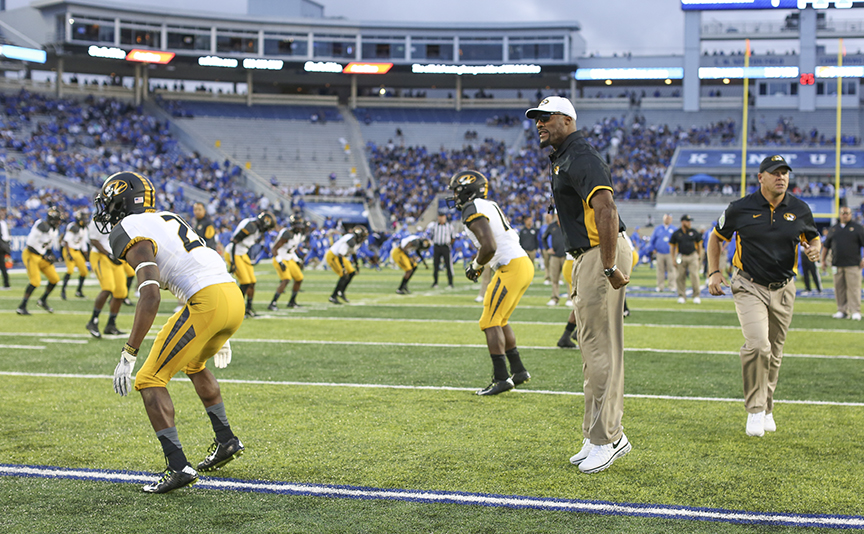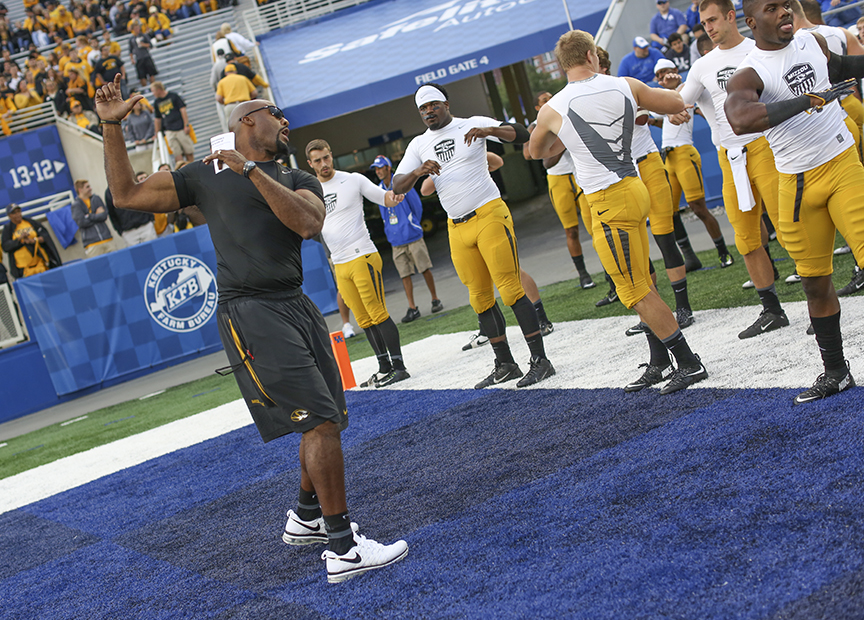
Story by Marcus Wilkins
Photos courtesy Mizzou Athletics
Published Oct. 16, 2015
It’s Homecoming 2015 at the University of Missouri. In Faurot Field’s south end zone, smoke emanates from the tunnel’s maw as the stadium sound system rumbles the rafters. An undulating wall of rowdy Tigers, eager to run onto the gridiron, strains against the outstretched arms of Pat Ivey. The man who has helped so many student-athletes reach new heights in the weight room is now physically holding them back.
Suddenly, as if the 6-foot-5-inch mountain of a man can no longer contain his progeny’s energy, the wave of black and gold overwhelms him and Mizzou storms the field.
Ivey, BS ’96, M Ed ’00, PhD ’13, knows precisely when to provide resistance and when to relent. It’s an integral part of his job as MU’s associate athletic director for athletic performance.
“Today more than ever, student-athletes don’t care how much you know until they know how much you care,” says Ivey, a student of Rick McGuire, MU professor emeritus of psychology and founder of the Missouri Institute for Positive Coaching. “We have to see them as people first. A lot of the athletes who have the most pressure on them are the least prepared for it.”
Ivey can relate to pressure, having played football at Mizzou during some especially lean years. Detroit born and raised, the former defensive end chose MU along with his close friend A.J. Ofodile, BGS ’01, the current head football coach at Rock Bridge High School. Coached by Bob Stull and then the late Larry Smith, the Tigers were 12-31-2 during Ivey’s years competing at Mizzou.
After graduation, Ivey signed with the San Diego Chargers and two years later went to camp with the Denver Broncos where he became friends with running back Terrell Davis (a signed photograph of the former MVP hangs on Ivey’s office wall). Had Ivey made the team, he’d be sporting a Super Bowl ring from the Broncos’ 1998 title. Instead, he returned to Mizzou, continued his education and ultimately joined the coaching staff.
Ivey is a trendsetter, incorporating new technologies such as GPS devices that track players’ movements, heart-rate monitors and urine tests that gauge hydration. But his psychological guidance is perhaps even more important to the success of Mizzou’s student-athletes and coaching staff.
“A frustrated coach can become a negative coach really fast,” Ivey says. “You have athletes who resist, defy and challenge, and others who are just slow to learn. A lot of my efforts go toward helping the athletes to think right. I help reinforce messages from their position coaches.”
When Ivey speaks, players listen. Countless Mizzou football alumni name Ivey as one of the most influential coaches during their time at MU, and in 2014, he was honored as the FootballScoop Strength and Conditioning Coach of Year.

“Pat Ivey is the first person you’re close to because when you come in as a freshman, you’re probably not starting — you have to get stronger and faster,” says former wide receiver T.J. Moe, BS BA ’12. “He’s in charge of the future.”
Moe says he still benefits from Ivey’s mental conditioning exercises and a team rule that limits post-mistake frustration to a five-second window.
“You park it, refocus, find what matters and execute,” Moe says.
So what message above all others does Ivey hope gets through by the time his players graduate?
“You’re going to be my age some day,” says Ivey, grinning widely. “What you do now is going to impact the life you’re going to have.”



